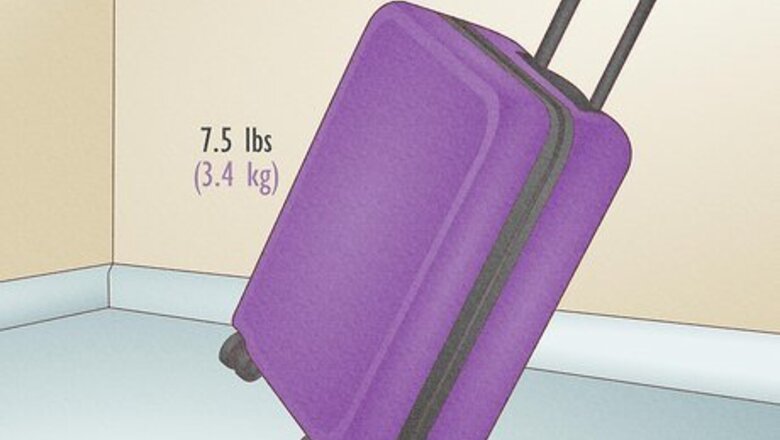
views
Buy the lightest carry-on bag you can find.
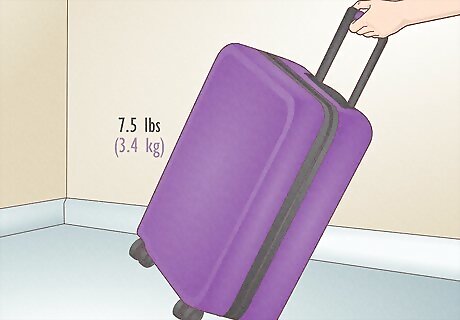
Pick a suitcase that’s under 7.5 pounds (3.4 kg). Choose a soft-shell suitcase, since they tend to be lighter weight and they’re more flexible. If you need, you can add an extra shirt or outfit into a soft-shell bag or squeeze in a few souvenirs for the trip home. Additionally, it’s easier to squeeze a soft-shell bag into a crowded overhead compartment. If you’re traveling domestically in the U.S., your carry-on should typically be 22 x 14 x 9 inches (55 x 35 x 22 cm) or smaller. If you’re an international traveler, make sure your bag is under 21 x 14 x 8 inches (53 x 36 x 20 cm). Every airline has different requirements, so double-check your airline’s website to confirm your carry-on will fit.
Roll your clothes.
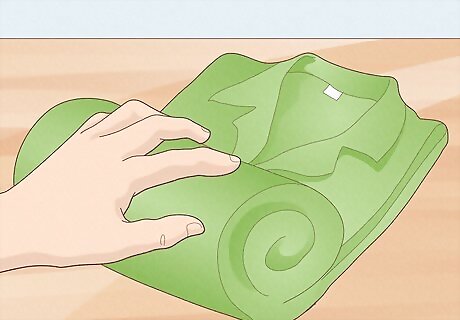
Skip traditional folding and roll up your clothes to get rid of air pockets. Simply fold in the sleeves of a shirt, fold the shirt in half so you have a long rectangle, and roll up the material. Rolling is a fast and easy way to ensure you can fill every nook and cranny in your suitcase. Fit underwear and socks into the smaller empty spaces of your suitcase instead of using the rolling method.
Use compression sacks or packing cubes.
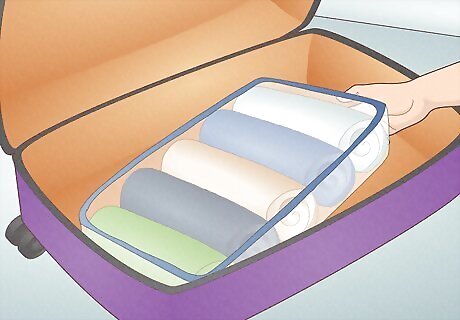
These fabric containers help you maximize space in your suitcase. Packing cubes are just zippered squares to organize clothes. Compression sacks, which you can purchase from an outdoor supply store, have straps that you can tighten to make sure your clothes take up minimal space. Put your rolled shirts into one organizer, your swimsuits in another, and your socks and underwear into their own cube. Just keep in mind, compressing your clothes saves space, but it won’t actually save weight. You might end up overpacking unless you combine compression sacks and/or packing cubes with a minimalist packing list.
Pack 1-2 pairs of shoes.
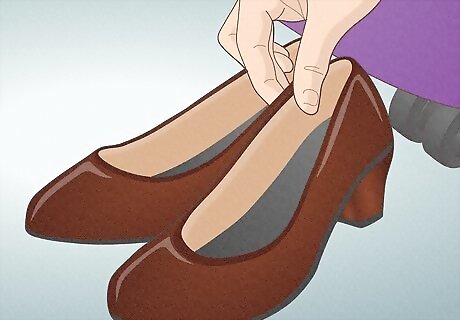
Bring shoes that are multipurpose. Go for a classy pair of sneakers that’ll feel comfortable for your daytime adventures but can also look decent at a nice restaurant. If just 1 pair of shoes feels too restrictive, add a second pair that has a slightly different purpose (maybe they’re dressier or more comfortable). Then, wear the heavier pair of shoes on the plane and pack the lighter pair in your bag. It’s ideal to have shoes for 3 different situations: being active and exploring, everyday casual wear, and dressier settings.
Fill your spare shoes with small items.
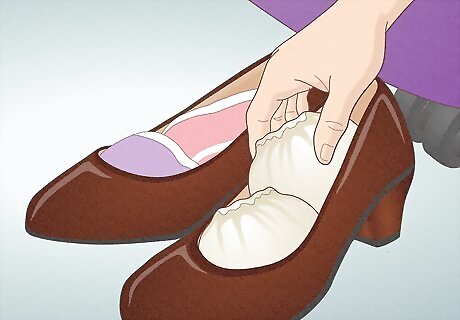
Stuff socks and underwear into the empty space in your shoes. If you have smaller items you’d like to protect, like a sunglasses case, you might also be able to fit those items into your spare shoes. Pack your shoes closer to the bottom of your bag or close to the wheelbase of your suitcase to balance out the weight. The best way to pack shoes is toe-to-heel, with the insteps facing each other.
Limit your electronics.
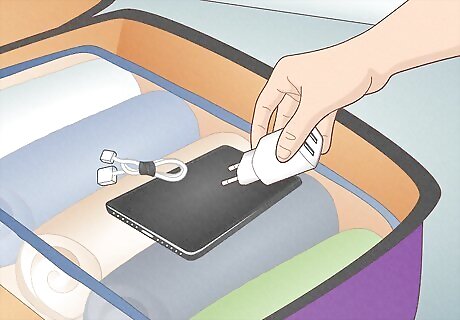
Consolidate the apps and data you need onto your phone or tablet. Instead of bringing a digital camera or e-reader, try using the camera app and library app on your phone. If you’ll still need to work on the trip, consider investing in a foldable Bluetooth keyboard you can hook up to a smaller device. Use gear ties, twist ties, or velcro straps to bundle your chargers together. Store your smaller electronics (like a camera battery and chargers) in their own packing cube.
Swap liquid toiletries for solid toiletries.
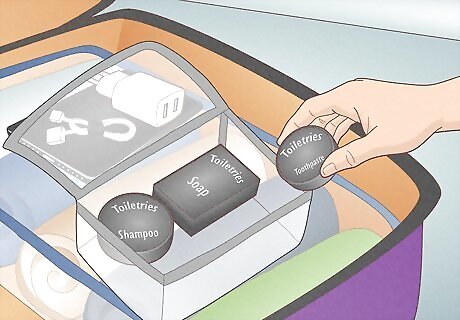
Solid toiletries can be lighter and they take up less space. You won’t have to worry about packing solid toiletries all into a quart-sized plastic bag to take out at security. Look for shampoo, conditioner, and even toothpaste in solid form. Hair products will typically look like bar soap, while solid toothpaste might be sold in a jar that looks like mints. You can cut solid soap bars into pieces to make them even lighter. Check out a camping supply store if you can’t find solid toiletries at a regular drugstore. If you’re traveling with your family, share toiletries for short trips. Have one person pack shampoo, have another person pack body wash, etc.
Take advantage of hotel toiletries.

Most hotels offer at least shampoo, conditioner, and soap in the rooms. To really cut down your carry-on weight, you might be able to get away with relying on your hotel to provide toiletries. If there’s an item you’d like that the hotel doesn’t offer in-room, just call the front desk. Many hotels also have a dental kit, deodorant, a razor, sunscreen, and more available upon request. If your hotel doesn’t offer the toiletries you want, odds are, you can easily buy what you need. The exception is for specialty or prescription products–make sure you pack those!
Go for all-in-one cosmetics.
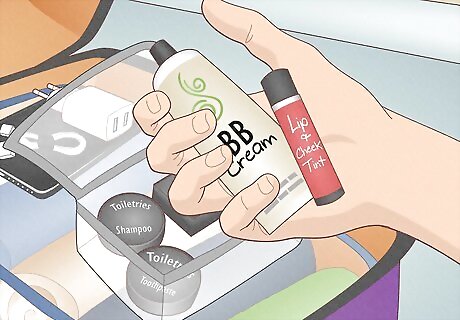
Slim down your makeup bag with these tips. Choose BB cream so you get a light-coverage foundation, moisturizer, and SPF protection all rolled into one product. Pack a lip and cheek tint so you can cut down on bringing both lipstick and blush (plus an extra brush). Instead of bringing an entire eyeshadow palette, stick to 2-4 colors. You can also buy cream-based products you can apply with your fingers so you don’t have to worry about bringing brushes.
Swap tampons and pads for a menstrual cup.
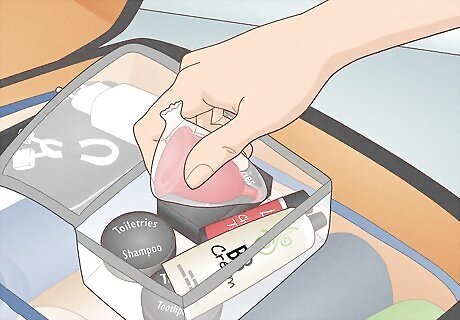
You’ll only have to pack 1 menstrual cup. If you’ll get your period on vacation, consider switching to a reusable menstrual cup during your travels to avoid packing bulky pads and tampons. Menstrual cups are made of rubber or silicone and they’re inserted like tampons. Unlike tampons, you simply clean out the menstrual cup every 4-8 hours, but you only need to replace the actual product every year. Only use a menstrual cup if you’ll have consistent access to soap and water every 4-8 hours when you need to empty it out and clean it. A backcountry camping trip might not be the most sanitary place to try this out. Think about whether you’ll be comfortable cleaning your menstrual cup in a public bathroom if you’ll be on the go during your vacation.
Bring a tote or drawstring bag as your second carry-on.
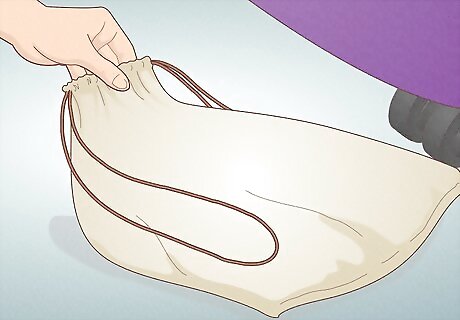
Opt for a bag with fewer zippers and less hardware to save on weight. While you could bring a traditional backpack for more storage, a tote or drawstring is a lighter, foldable option for a daypack. You can also use this spare bag to separate dirty laundry from clean laundry. Check to make sure your airline allows a second carry-on (usually called a “personal item”). Your personal item usually has to be small enough to fit under the seat in front of you. If you’re worried about theft or if you’re traveling in an urban area, be cautious about using a drawstring bag. Thieves can easily cut the straps to take the bag, or they can reach in to get your valuables.
Wear your bulkiest clothes on the plane.
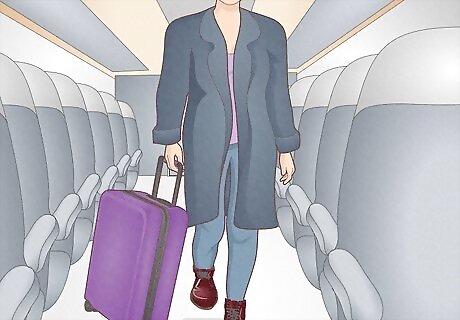
Put on your heaviest coat and shoes. Wearing your heavy items frees up valuable space in your carry-on, and it lets you stay warm on the plane. You can also throw on your hat, scarf, or other miscellaneous items that take up space in your bag. For instance, if you have to bring rain boots, wear those on the plane.
Create an essentials-only packing list.
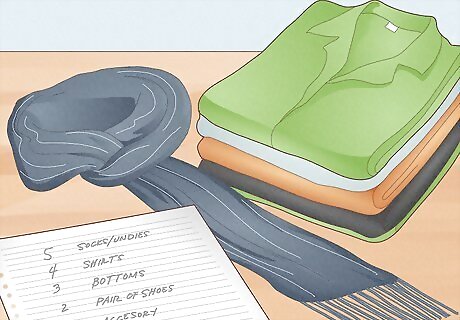
Pack your “must-have” clothes and skip the “nice to have” items. Take a look at your itinerary and planned activities, and choose items you know you can wear multiple times. Lay all your clothes out for a big-picture look at what you’re bringing. Before you put anything in your bag, do one last “edit” and take out any clothing that you don’t really think you’ll wear. If a piece of clothing isn’t something you’d normally wear or feel comfortable in (that flashy suit or pair of high heels), you might not end up wearing it on vacation. For a sample 7-day packing list, follow the 5-4-3-2-1 rule. Bring 5 pairs of socks and underwear, 4 shirts, 3 bottoms, 2 pairs of shoes, and 1 accessory (like a hat or scarf). For a 5-day trip, try to pack 4 pairs of socks and underwear, 3 shirts, 2 bottoms, 1 pair of shoes. These packing lists might seem sparse, but you can always do laundry at your destination. Many laundromats accept credit cards with a small processing fee, but pack cash if you want to avoid extra fees.
Pick clothing you can mix and match.
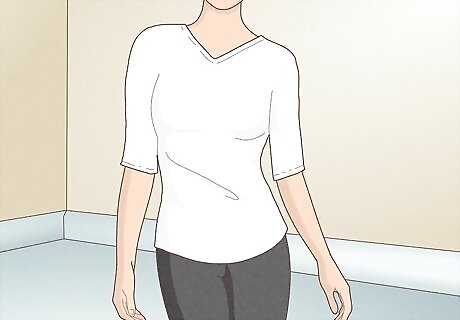
Stick to neutral colors or classic colors that fit your environment. The right colors make it easy to plan outfits and re-wear items. If you’re traveling to an urban area like New York City, opt for clothes that are black, white, navy, and charcoal. If you’re headed to Tahiti for a beach vacation or to a lakeside retreat, pick lighter shades. Go for khaki, ivory/white, and bright hues like orange or yellow for a little summer flair. You can’t go wrong with a pair of jeans, a neutral-colored tee shirt, and a casual blazer or hoodie.
Opt for lightweight fabrics.
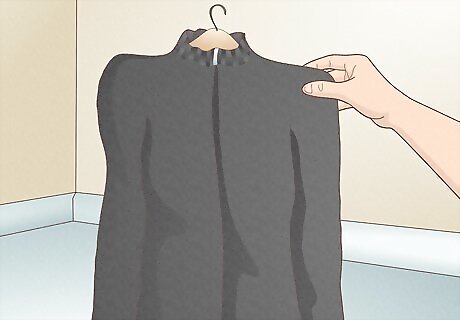
Get gear designed for ultralight backpackers and outdoor adventurers. Visit an outdoor gear store and pick up “technical” clothes made of silk, nylon, or polyester. These materials are lighter in weight, and they’re designed to be re-worn without washing. Cotton tends to be bulkier, it wrinkles easily, and it can start to smell more quickly than breathable athletic fabric. Wool will keep you warm, but if you’re traveling somewhere cold, opt for ultralight wool products rather than bulky sweaters. Bring layers instead of a heavy coat. Go for packable down jackets to maximize warmth while cutting down on bulk.












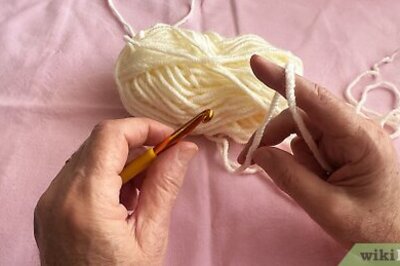





Comments
0 comment